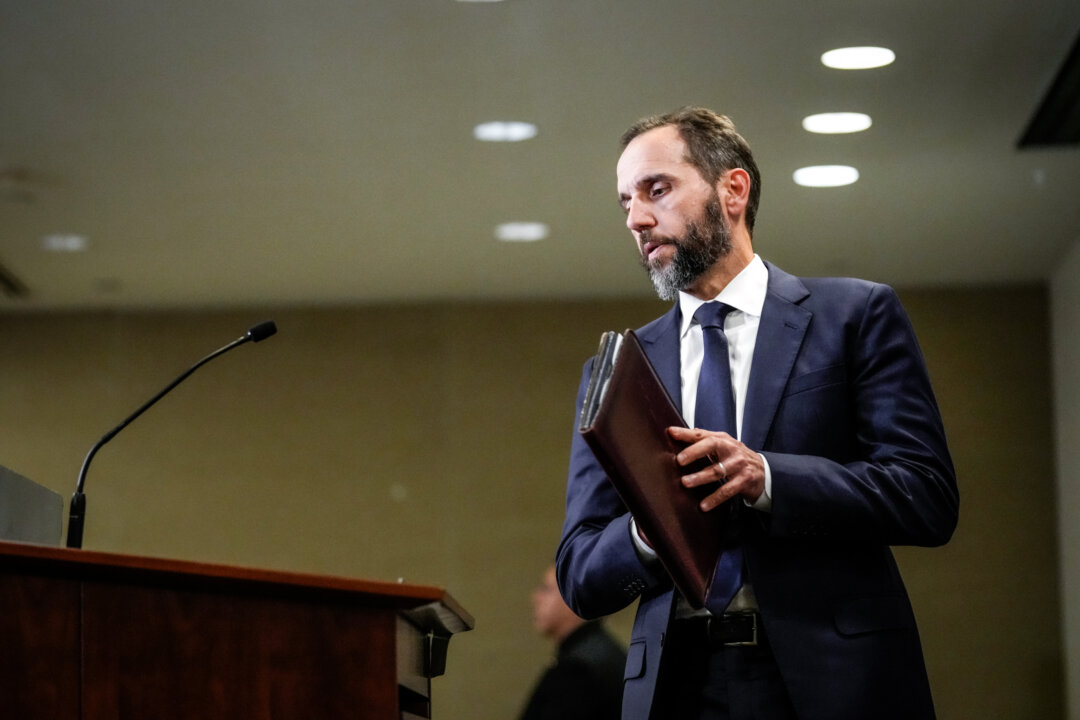Federal law requires special counsels to prepare a final report outlining their prosecution decisions and submit it to the attorney general.
Special counsel Jack Smith has resigned from the Department of Justice (DOJ), prosecutors revealed in a court filing, with the announcement marking an end to Smith’s role spearheading two investigations into President-elect Donald Trump.
“The Special Counsel completed his work and submitted his final confidential report on January 7, 2025, and separated from the Department on January 10,” Brian Boynton, principal deputy assistant attorney general, wrote in a document filed on Jan. 11 at the U.S. District Court for the Southern District of Florida.
Smith was appointed by Attorney General Merrick Garland to investigate Trump in two separate cases—one charging him with election-related crimes and another accusing him of illegally retaining classified documents at his Mar-a-Lago home after he concluded his first term at the White House. Both cases were challenged over the legitimacy of Smith’s appointment.
By leaving office, Smith will avoid the president-elect’s pledge to fire him “within two seconds” of Trump taking the oath of office on Jan. 20, 2025. Trump has denied wrongdoing in the cases led by Smith and has repeatedly characterized the prosecutions as politically motivated.
After Trump won the election in November, Smith dropped the charges against Trump in both cases.
“The (Justice) Department’s position is that the Constitution requires that this case be dismissed before the defendant is inaugurated,” Smith wrote of the election subversion case in a Nov. 25 filing with the U.S. District Court for the District of Columbia. “This outcome is not based on the merits or strength of the case against the defendant.”
Hours after Smith filed the motion to dismiss, U.S. District Judge Tanya Chutkan agreed to drop the election case.
Similarly, in a motion on Nov. 25, Smith asked the U.S. Court of Appeals for the 11th Circuit to dismiss the classified documents case, citing the same reason—Trump’s election win and impending inauguration as the 47th president. However, Smith kept the case active against two of Trump’s co-defendants in the case, Walt Nauta and Carlos De Oliveira.
Both cases against Trump were dismissed “without prejudice,” meaning charges could be refiled after Trump finishes his second term as president. Standing in the way of potential re-prosecution is the statute of limitations, as well as the possibility that Trump could use his presidential powers to pardon himself.
Before resigning, Smith completed a final report from the two Trump investigations. Garland told congressional leaders that the report would be made public once cleared by the courts.
Garland then told key members of the Senate and House Judiciary Committees in a letter that the DOJ is temporarily restricted from sharing the report due to a court order issued by U.S. District Judge Aileen Cannon.
The attorney general told lawmakers that the report would be released once the related criminal cases are fully resolved.
Federal law requires special counsels to prepare a final report outlining their prosecution decisions and submit it to the attorney general, who has the discretion to determine whether the report will be made public.
Smith’s resignation punctuates the end of his criminal pursuit of Trump over the past two years or so.
In a key development during litigation, the election case led to a July 1, 2024, U.S. Supreme Court decision indicating that presidents can enjoy some immunity from prosecution for their official acts and duties.

